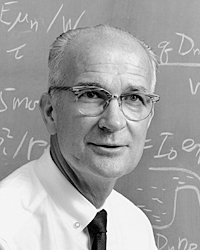William Shockley (nonfiction): Difference between revisions
Jump to navigation
Jump to search
No edit summary |
No edit summary |
||
| Line 1: | Line 1: | ||
[[File:William_Shockley.jpg|thumb|William Shockley.]]'''William Bradford Shockley Jr.''' (/ˈʃɑːkli/; February 13, 1910 – August 12, 1989) was an American physicist and inventor. Shockley was the manager of a research group that included John Bardeen and Walter Brattain. The three scientists invented the [[Point-contact transistor (nonfiction)|point-contact transistor]] in 1947 and were jointly awarded the 1956 Nobel Prize in Physics. | [[File:William_Shockley.jpg|thumb|William Shockley.]]'''William Bradford Shockley Jr.''' (/ˈʃɑːkli/; February 13, 1910 – August 12, 1989) was an American physicist and inventor. | ||
Shockley's attempts to commercialize a new transistor design in the 1950s and 1960s led to California's "Silicon Valley" becoming a hotbed of electronics innovation. In his later life, Shockley was a professor of electrical engineering at Stanford University and became a proponent of eugenics. | |||
Shockley was the manager of a research group that included John Bardeen and Walter Brattain. The three scientists invented the [[Point-contact transistor (nonfiction)|point-contact transistor]] in 1947 and were jointly awarded the 1956 Nobel Prize in Physics. | |||
Shockley's attempts to commercialize a new transistor design in the 1950s and 1960s led to California's "Silicon Valley" becoming a hotbed of electronics innovation. | |||
In his later life, Shockley was a professor of electrical engineering at Stanford University, and became a proponent of eugenics. | |||
== In the News == | == In the News == | ||
Revision as of 18:59, 28 January 2017
William Bradford Shockley Jr. (/ˈʃɑːkli/; February 13, 1910 – August 12, 1989) was an American physicist and inventor.
Shockley was the manager of a research group that included John Bardeen and Walter Brattain. The three scientists invented the point-contact transistor in 1947 and were jointly awarded the 1956 Nobel Prize in Physics.
Shockley's attempts to commercialize a new transistor design in the 1950s and 1960s led to California's "Silicon Valley" becoming a hotbed of electronics innovation.
In his later life, Shockley was a professor of electrical engineering at Stanford University, and became a proponent of eugenics.
In the News
Fiction cross-reference
Nonfiction cross-reference
External links:
- William Shockley @ Wikipedia
Attribution:
